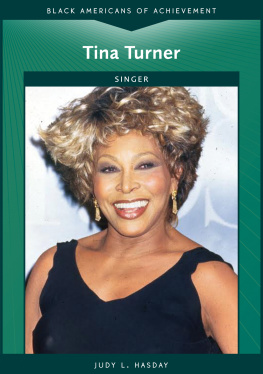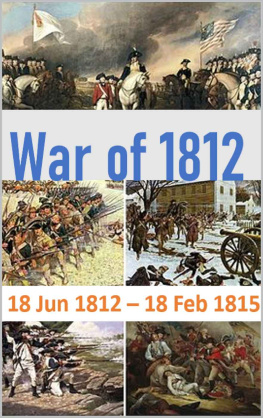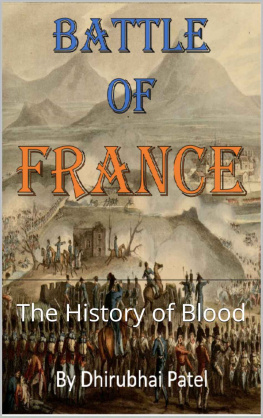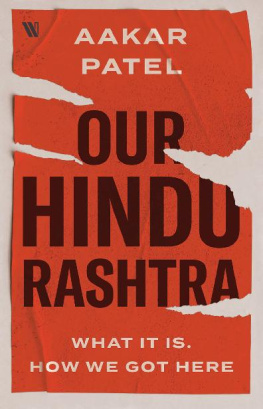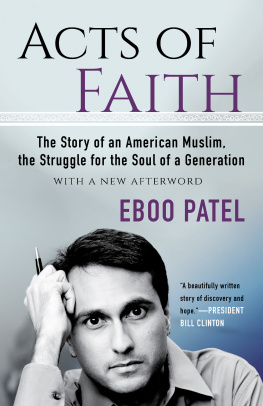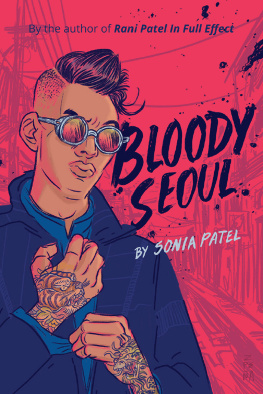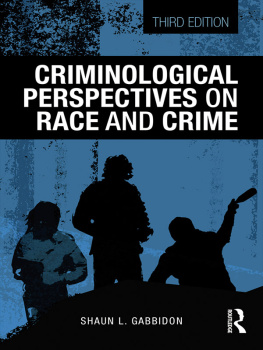RACE, CRIME
and RESISTANCE
SAGE has been part of the global academic community since 1965, supporting high quality research and learning that transforms society and our understanding of individuals, groups, and cultures. SAGE is the independent, innovative, natural home for authors, editors and societies who share our commitment and passion for the social sciences.
Find out more at: www.sagepublications.com
RACE, CRIME
and RESISTANCE
Tina G. Patel and David Tyrer
Tina G. Patel and David Tyrer 2011
First published 2011
Apart from any fair dealing for the purposes of research or private study, or criticism or review, as permitted under the Copyright, Designs and Patents Act, 1988, this publication may be reproduced, stored or transmitted in any form, or by any means, only with the prior permission in writing of the publishers, or in the case of reprographic reproduction, in accordance with the terms of licences issued by the Copyright Licensing Agency. Enquiries concerning reproduction outside those terms should be sent to the publishers.
SAGE Publications Ltd
1 Olivers Yard
55 City Road
London EC1Y 1SP
SAGE Publications Inc.
2455 Teller Road
Thousand Oaks, California 91320
SAGE Publications India Pvt Ltd
B1/I 1 Mohan Cooperative Industrial Area
Mathura Road, New Delhi 110 044
India
SAGE Publications Asia-Pacific Pte Ltd
33 Pekin Street #02-01
Far East Square
Singapore 048763
Library of Congress Control Number: 2010936933
British Library Cataloguing in Publication data
A catalogue record for this book is available from the British Library
ISBN 978-1-84920-398-2
ISBN 978-1-84920-399-9
Typeset by C&M Digitals (P) Ltd, Chennai, India
Printed by CPI Antony Rowe, Chippenham, Wiltshire
Printed on paper from sustainable resources
Contents
About the Authors
Dr Tina G. Patel joined the University of Salford in September 2008, as Lecturer in Criminology. Her research and teaching interests relate to race, racism, exclusion, police and violent behaviour. She is currently undertaking work into the policing of racist violence in Northern Ireland, and use of racial profiling within the context of the war on terror.
Dr David Tyrer is a member of the Centre for the Study of Crime, Criminalisation and Social Exclusion and Senior Lecturer in Sociology at Liverpool John Moores University. His research interests are broadly concerned with race, racism and postcoloniality, and his recent work has focused on relations between states and racialised and ethnicised minorities. He has a long-standing research interest in Islamophobia on which he is currently preparing a monograph.
Acknowledgements
Tina G. Patel: Thank you to colleagues at the University of Salford especially those in Sociology, whose guidance, support and space for development allowed this book to be written. For your love, care and encouragement, dedication is reserved for my family (Patel and Hamilton), especially my partner (David).
David Tyrer: I would like to record my thanks to those friends and family members whose support has meant so much to me. I owe a particular debt of gratitude to the following: B.A. and O.W. Tyrer; A.K.B.; colleagues in Criminology and Sociology at LJMU for providing institutional and intellectual support (especially Joe Sim, Liz Sperling, Margaret Edwards, Jenny Van Hooff and Bryan Scott); Shai; Bobby; A.K.V.; Antonio; Federica; Danielle; Gareth, Helen Churchill Charlie; and Tina G. Any shortcomings are mine, and not a result of the support offered by these individuals.
We would also like to thank all those involved in the research studies mentioned, including the funders, colleagues and those participants who so willingly gave up their time to discuss their experiences. Our thanks go also to our respective colleagues and collaborators who have supported the development of our work, and especially to Gillian Hall. We would like to thank our anonymous reviewers for their insightful comments on earlier drafts, and to express our gratitude to staff at Sage especially Caroline Porter and Sarah-Jayne Boyd. Finally, we wish to acknowledge all those who have kept up the struggle when others have faded.
Introduction: Constructing the RaceCrime Problem
This book is about the continued and subtle ways in which crime is constructed as racialised in post-Macpherson UK. Macpherson (1999) is a report on an inquiry following the 1993 racist murder of Stephen Lawrence, a black African Caribbean youth in London. The report highlighted failures of the Metropolitan Police Service and problems of institutional racism, making a number of recommendations for criminal justice institutions. Consequently, there are seemingly more entrenched systems for reporting, monitoring and combating institutionalised racism, and yet the modalities of racism seem to have articulated with this, ostensibly hostile, institutional framework in order to persist in ever more ambiguous and nebulous forms. This book argues that notions of black criminality are often reworked in new ways and have fed into the wider policy on community cohesion and citizenship (Khiabany and Williamson, 2008) that often directly takes black and minority ethnic people as objects of state intervention, while claiming not to be racialised. An important theme of the book is the ways in which ideologies of scientific racism which were in the past woven into state policies on crime control in countries such as Britain, USA, South Africa and Germany have resurfaced, articulating in new ways with forms of cultural racism, and being expressed in new ways, for example through calculations of risk rather than strict biological hierarchies. The key issue being highlighted is that, in spite of claims that we are in a post-racial age, problematic construction of crimes as racialised persist, illustrated more recently, for example, by moves towards increased racial profiling, meaning that older notions of black criminality and the dangerous immigrant other, undeserving of a right to a place in Britain, are once again appearing. The book will consider how and why certain racialised groups are vulnerable to the discriminatory practices of criminal justice agencies. In doing so, it will also highlight how their claims to knowledge and experience have been marginalised, presenting the argument that this urgently needs to be replaced by practices that are underpinned by an ethos of access, equality and empowerment. The aim therefore is not only to shed critical light on the continued utility of race in what are sometimes described as post-race times, but also to highlight how this thinking and its impact on crime has been, and continually needs to be, challenged.
Before we continue, some clarification is needed for the terms that are used in the text. Terms of reference are constantly changing, being negotiated and updated on a variety of local and global levels. It is acknowledged that race talk is in itself a complex, political and contested process. The term in itself is problematic and contested, highlighted in some sources by the use of inverted commas (Mason, 2000: 8). Debates run about its continued use in social science disciplines, with valid arguments being presented about the responsibility of academics being to replace it with other preferable terms of reference, such as ethnicity. However, our studies tell us that race is still treated by many in society as a real entity, by which lives are organised and behaviour is constructed (Mason, 2000). We therefore use the term race here not descriptively to refer to a given attribute, but instead as an analytical term to describe a process of power which impacts upon all of us in different but significant ways, for example how Muslims as a seemingly religious community are still racialised as a group. So, even though ethnicity is often preferred over race, the latter is still a term that is analytically relevant, especially in terms of the matters discussed in this text. Although we view the use of the term in inverted commas as relevant, the regular use of the term in this text means that encasing it in inverted commas would hinder readability flow. The reader should therefore take our use of the term (





